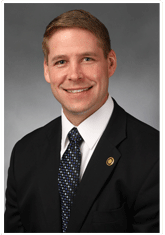JEFFERSON CITY — Last week, the Capitol Report focused on successful legislation in which I had a hand. This week I want to share some of the other bills that were “truly agreed to and finally passed” by the First Regular Session of the 97th General Assembly. Like the legislation I discussed last week, these bills have been sent to the governor’s desk, and he has 45 days to sign, veto or ignore (effectively agreeing to) each bill.
All in all, 82 Senate Bills and 80 House Bills were sent to the governor out of more than 1,500 bills filed: 484 in the Senate and 1033 in the House. Many dealt with local issues important to the sponsor’s district.
It often takes several years to pass tough legislation, especially on controversial topics. This year we finally passed a fix for the Second Injury Fund and changes to Workers’ Compensation laws that have been discussed for approximately four years. Senate Bill 1 was a true compromise between both bodies and several competing interests. SB 1 adjusts fees to businesses to keep the Second Injury Fund solvent. It also deals with occupational diseases and other Workers’ Compensation issues.
While a big picture economic development or tax reform bill did not make it across the finish line, we did renew several benevolent tax credits in Senate Bills 20, 15 & 19, many of which had expired last year. These credits, some at no cost to the state, allow charities to raise money and give tax credits to donors.
Senate Bill 125 allows the Department of Elementary and Secondary Education to take over failing, unaccredited school districts sooner, among other provisions. Aimed at the Kansas City Public Schools, this bill was kept back last year for other reforms, but was passed by both bodies this year.
Two labor-related bills were passed, both significantly watered down from their original form. Senate Bill 29 puts union payroll deductions at the same level as other contributions, requiring a yearly opt-in from the employee. Senate Bill 34 waives prevailing wage laws for school construction in rural areas. Currently, many of those areas end up having to use big city wages because of lack of local union reporting.
House Bills 1 through 19 were passed, representing another balanced budget with significant increases for both K-12 and higher education. Because revenues are running ahead of estimates, money was also set aside for some sorely needed capital and infrastructure improvements.
Senate Bill 75 provides some simple 2nd Amendment protections, including taking Concealed Carry Weapon permit responsibility away from the Department of Revenue and giving it to the local sheriff who already processes the paperwork.
|



